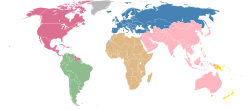| Organiser(s) | FIFA |
|---|---|
| Founded | 2025 |
| Teams | 16 |
| Related competitions | FIFA Futsal World Cup |
| Current champions | |
| Most championships | |
The FIFA Futsal Women's World Cup is an international futsal competition set to be contested by the senior women's national teams of the member associations of FIFA, the sport's global governing body.

